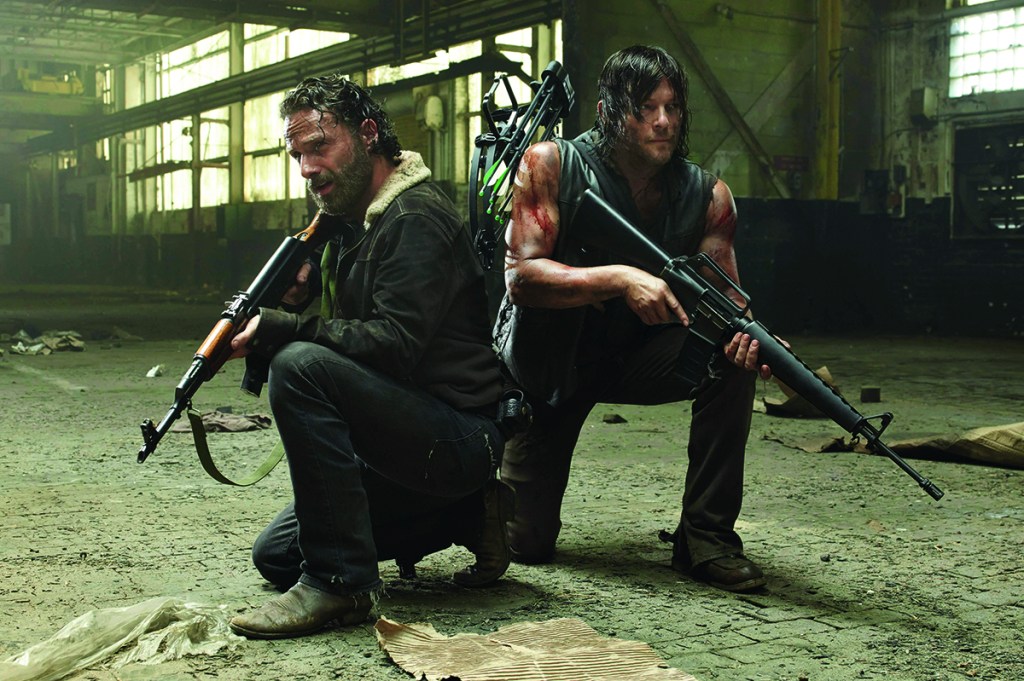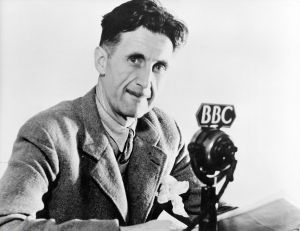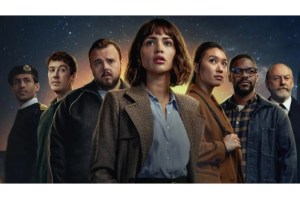It was the middle of July 2007. The dead-summer streets of Phoenix, Arizona, were fairly smoldering, so I went into a comic-book shop to beat the heat. I was shipping out to Iraq with the Marine Corps in two days and needed something to distract me. Indulging in a bit of casual melodrama, I asked the half-stoned employee behind the desk what he would read if he had two days to live. Without a second’s pause, he gave a knowing smile and said: “The Walking Dead, man.”
Robert Kirkman never expected his comic to turn into the dominant media phenomenon it has become over the past two decades. But nerd culture has a funny way of jumping the bridge into mass media. The series’ iconic opening scene, of a local Kentucky cop waking up from a coma in the weeks after the worst of the apocalypse, became the launching pad for an entire category of tales.
The Walking Dead is not just a comic, a multi-award-winning show — the eleventh and final season of which concludes this month — or any of the various spinoffs, podcasts, games and other experiences condensed into a single universe. It is an expression of deep anxiety about an uncertain world. The post-Cold War globe seems to have spun off its axis, and the new millennium greeted us with an avalanche of disasters. The institutions of modernity are still here, but they’ve mutated and deformed in ways that leave us feeling unsteady on our feet. The question of apocalypse continues to be “when,” not “if.”
One distinguishing feature of Kirkman’s story is that it doesn’t begin in that archetypal cityscape that has defined the dystopian imagination. For those of us raised on the outskirts of life — in the deserts, mountains and open expanses of country — characters like Rick, Shane and Daryl felt like people that we knew. This wasn’t a tale of superheroes, of space marines and technological wizardry pitted against fantastical mutants and monsters, but one of common people trying to survive — and finding the grit to do it.
The Walking Dead television series launched not long after the financial crash of 2008 and was shaped by the precarity of those times, fitting it into the classical American Western paradigm. We are Americans, the show seemed to say, and even in moments of desolation, when death is just one-too-few bullets away, we’ll nevertheless find a way to survive. The battered and benumbed wife, the wandering military veteran, the morally principled mountain man — The Walking Dead put these archetypes up against something worse, much worse, than what its viewers were facing in real life. And so it told us that if these characters could get through, we could get through.
My brother called me not long after season one ended, wanting to know if I’d go buy some guns with him. I met him at the nearest gun club by his house and we asked for a Colt Python and a Remington 870. The man behind the counter said, “Got a real-life Rick and Shane here.” And we beamed with pride.
The show began to meander over the ensuing seasons, with long drawn-out episodes where not a single walker would be killed and the stakes felt low. Interest faded. Audiences wanted survival and Revelation, not a preacher’s sermon. But when season six ended and Jeffrey Dean Morgan’s Negan walked out with his barbed-wire-wrapped bat, the show was back.
When the beloved main character, Rick, finally exited the show, many viewers tuned out for good. Rick’s death concludes the comic, but the series was too popular (and lucrative) for the showrunners to call it quits. But there’s only so much Walker blood you can draw from a stone. As of this writing, The Walking Dead is finally coming to a close. It’s the end of an era in television. Looking back on the series as a whole, we sense we’re dealing with a modern classic, and that particularly post-2008 precarity feels more timeless than ever.
At their summit at Lake Geneva in 1985, Ronald Reagan and Mikhail Gorbachev took a break from negotiations to go for a walk. According to Gorbachev, Reagan raised the possibility of an extraterrestrial invasion out of nowhere. “What would you do if the United States were suddenly attacked by someone from outer space?” The president asked: “Would you help us?”
Gorbachev responded: “No doubt about it.”
Reagan: “Us too.”
It is strange to think that the end of the world might bring us together. But when The Walking Dead arrived, it made us feel that as dark as things were, we could find light in that which set us apart from the savagery and decay — the mark of something truly human.
This article was originally published in The Spectator’s October 2022 World edition.


















